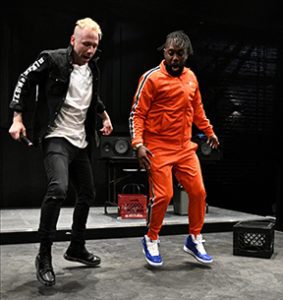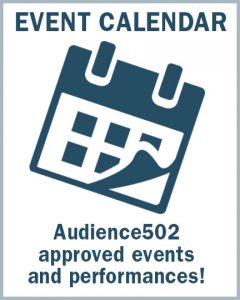 Waiting a little longer won’t kill us.
Waiting a little longer won’t kill us.
Waiting a little longer IS what’s killing us.
The exchange of dialogue between two of the three characters of Hype Man: a break beat play hits like a gut-punch when its deployed by Idris Goodwin’s script to set up the second act of his microcosm of racial tensions in the era of Black Lives Matter.
The trio represent a Goldilocks-esque set of perspectives on excessive police force against African-Americans and what to do it about it. Too cold? Too hot? Is “just right” even possible in the era of double-down politics?
Pinnacle (Shane Kenyon), a white rapper in the style of an up-and-coming Eminem, is the most reluctant to take a controversial stand among the small, up-and-coming hip-hop group. Verb (Mykele Deville) is an appropriate stage name for a man who is about action at almost any cost. A black man, he is red-hot to use their increasing fame to speak out against the police shooting of an unarmed minority motorist named Gerrod, which sets up the conflict for the play. Peep One (Angelica Santiago) is a mash-up of ethnicities, unwilling even to open the results of a DNA test that could illuminate her racially diverse background. Vacillating between a seemingly incompatible desire to propel reform and a passion to grow her solo career as a beat-maker, her dilemma stands in for the kind of moral ambiguity that confounds many who don’t have to worry about Driving While Black yet struggle with what to do about the phenomenon.
Hype Man: a break beat play.
by Idris Goodwin
Directed by Jess McLeod
Through October 13, 2019
Go here for tickets and more information
The play is a series of varyingly intense conversations punctuated by brief exposures to the group’s performances, first on The Tonight Show and then in concert. Both are knocked off stride by Verb, the hype man, a position in a hip-hop group intended to amplify the message of the lead performer with his own dynamic physicality and verbal reactions to it. He cannot, it seems, stop himself from hyping the injustice of Gerrod’s death, and his resolve threatens to destroy everything the three have tried to build.
His protests are well intended but set up trouble with the group’s sponsors and jeopardize Pinnacle’s trajectory, already challenged as he confronts rejection from all sides as a white man trying to make it in a black man’s world. How far can Pinnacle go to accommodate the activism of his childhood friend and now music partner without permanently alienating one of the constituencies he needs to maintain street cred, sell records and book concerts?
Ultimately, it’s up to Peep to set the rhythm for both the tracks Pinnacle performs and the maintaining of the dynamic among them (if doing so is possible) as they navigate loyalties to art, fame, justice and, most complicated of all, friendship.
Director Jess McLeod does an admirable job keeping the small cast moving and enlarging the action so that the approximately 90-minute play feels larger in scope than what those elements might suggest. The musical numbers provide welcome relief, keeping the play from becoming too dense on ideology; I’ll leave it to hip-hop devotees to judge whether the performances pass muster. But the greatest moves may be those of playwright Goodwin. Without once letting his characters devolve into preaching or smacking the audience in the collective noggin with a Message, he manages to present evenly for our judgment various perspectives on how the woke world ought to respond to BLM. The play, then, is not so much about the villain, or even how to defeat him, but when and how it may be best to take him on.
Photo by Jonathan Roberts





